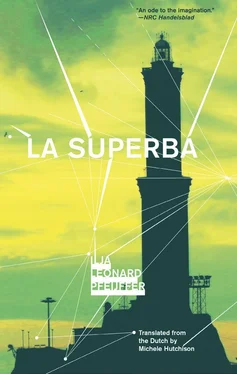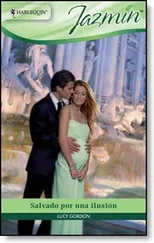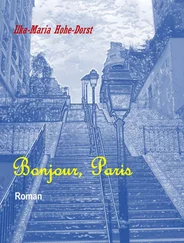42.
“What do you think my biggest problem is?”
She didn’t answer. She didn’t look at me, either. She took a sip of her cappuccino, slowly lit a cigarette, and stared across the square. Her gaze was cold. She didn’t look like a person pondering a difficult question but like someone demonstratively ignoring the questioner in annoyance at the fundamental lack of understanding the question testified to. She exhaled her smoke, but it was as though she was sighing. She didn’t move, but it was as though she was shrugging. She was beautiful. She was even more beautiful than normal. She had changed from an Italian girl into a sculpture of an Italian girl. She was a Madonna in the Doge’s private chapel, sculpted from the finest Carrara marble. He delighted in the fine features of her immobile, silent face each morning during prayers and once again at vespers. He kneeled, hands clasped, and was amazed at the way her nose, her chin, her jawline could be both angular and soft at the same time. She was noble. During his prayers, he imagined what it would be like to kiss her. And her wrists and ankles looked so breakable. It was incomprehensible that she could exist in marble like a featherweight fantasy of spun sugar. And in real life, in real life — he imagined how her hands, her arms, her whole body would succumb like a snow-white butterfly to his embraces and caresses. The statue had become more precious to him than his own wife. It was to her he prayed. He had ripped off the artist with a budget price for which the Doge couldn’t even organize a banquet.
What he didn’t know was that the destitute sculptor had modeled the Madonna on his great love, the daughter of the baker on Piazza Fossatello. He dreamed of her every night. Every morning, he went to the bakery to catch a glimpse of her. She never showed the slightest bit of interest in him. She never even gave him a second glance. For her, he was just another bum from the alleys. But for him, just seeing her was enough. A day that began with the sight of her was a beautiful day with golden yellow sunshine on the palaces of Genoa. A day that began without her, because she was ill or had been sent on an errand that morning, was as black as the night with bitter rain in the dark alleys. He worshipped her. Oh, if only she knew who he was. If only she could come with him to the Doge’s Palace and see how he had caressed her into existence with his hammer and chisel. But how could a baker’s daughter ever gain access to a Doge’s private chapel? His own access to the palace had been blocked the day he’d completed his masterpiece and received what he saw as a very generous payment.
But one day the baker’s daughter did enter the Doge’s Palace. She’d been sent on an errand that morning. She had to deliver baskets full of focaccia for the banquet being held that evening. She happened to come out of the kitchen just as the Doge was coming down the stairs. She’d taken the wrong door, and to her horror, found herself in the large stairwell used by the noblemen and women. He saw her. She was the spitting image of the love of his life. She had the same angular and soft lines in her face. There was the same flimsiness to her ankles and wrists. Her hands looked like fragile confectionary concoctions.
“You live in your fantasies too much.”
She still wasn’t looking at me. But she’d replied. She had actually deigned to give me an answer. Although it was intended as a reproach, it was still an interesting answer. I heard three deep blasts of a ship’s horn. In the harbor, a large ship was about to set sail for Barcelona, Tunis, Jerusalem, or La Merica. Of course I live in my fantasies too much. It’s my job. Every day I have to reinvent Genoa and populate it with the people I see and bring to life the thoughts they have. I have to caress Genoa into existence each day out of the meaningless, rough blocks of marble from the palazzi with my hammer and chisel, and model them to fit the image of my imaginary beloved. I have to fantasize myself in her arms and invent that I am at home in her embrace, and happy. I have to fantasize myself into a Genoese. I have to blow the salty sea wind from my lungs into the alleyways. I have to make the shutters rattle and every baker’s daughter or fishmonger curse. I put the stoccafisso , the cima , the trippe, and the pesto on the shelves of all the stinking shops in Via Canneto Il Lungo, in Macelli di Soziglia and in the Sottoripa arcades. I have to paint the whores black and make the knife shop on the corner glitter. I have to construct the terraces and the roofs, the corners and the cracks, the squares as big as a Fiat Cinquecento and the alleys as wide as a handcart. I have to spit out the dirt, the stench, and the rats into the labyrinth. I have to make the Moroccans and the Senegalese suffer, eleven to a room.
“But is that bad?”
She didn’t answer. With a snow-white cappuccino in a snow-white cup on a snow-white saucer, she stared across the snow-white marble square in front of the Doge’s marble palace.
“You think you’re a good man,” she said. She took a drag of her cigarette and stared into the distance. The tourist train from Porto Antico to Porta Soprana jingled past. “But that’s just your imagination.”
And how things turned out with the baker’s daughter and the Doge is something you can come up with yourself, my friend. Did they get married? What do you think? And when nine months later her disgrace saw the light of day and she said he was the Doge’s son, do you think they believed her? And what if they didn’t? Just fantasize, my friend. Unfortunately, as is generally the case, your darkest fantasies will turn out to be the truth.
43.
I hadn’t seen Rashid for quite a while. Other rose sellers had taken over his neighborhood. They were even less successful than he had been. I would be lying if I said I’d thought of him often. From time to time I thought of him, but I didn’t go to any trouble at all to try and track him down.
And then all of a sudden I saw him at the end of the Via del Campo, close to the Porta dei Vacca. He had visibly gained weight and was wearing a nice suit with an Italian cut and a pair of sophisticated shoes. I greeted him. He didn’t see me. I greeted him again.
“I’m busy, Ilja.”
I apologized. “You look well, Rashid. Did you find a job?”
He nodded.
“As an air-conditioning installer? The same work you always did back in Morocco?”
“Sorry, Ilja. I have an appointment.”
After that I saw him a couple more times, mainly on Piazza delle Erbe, toward the end of the evening. He had stopped greeting me. He avoided my eyes. He usually installed himself at the yellow tables of Bar Gradisca. He waited for others and when they appeared, he went into the labyrinth with them. Sometimes he came back later to wait for other clients, sometimes he didn’t. He had become a businessman and didn’t deem his old friends worthy of a second glance.
And after that, he disappeared completely. I asked Oscar, the owner of Gradisca’s, whether he knew anything. He shrugged. When I continued to ask, he walked away. I asked Mustafa, a fellow Moroccan who put the tables out in the morning for Oscar, whether he’d heard anything. He said that all his friends were Italians, that he didn’t know a single Moroccan, and certainly no one called Rashid.
A few days later, Oscar took me aside. He didn’t say anything. So that I could never say he’d said anything. He put his index finger to his lip to emphasize the point. After that he closed one nostril with the same finger and made a snorting noise with the other. Then he put both of his wrists together in a gesture that suggested handcuffs. “Marassi,” he whispered. And I’d been in Genoa long enough to realize he didn’t mean the stadium but the prison in the same neighborhood.
Читать дальше












